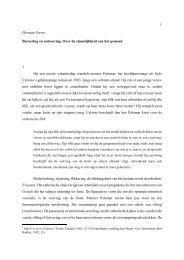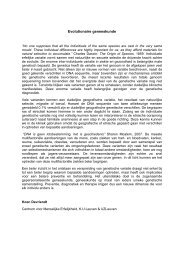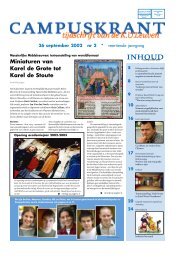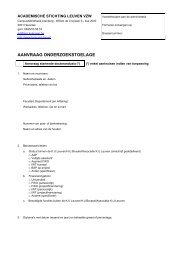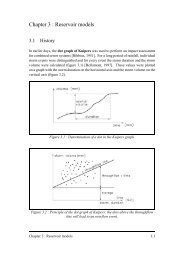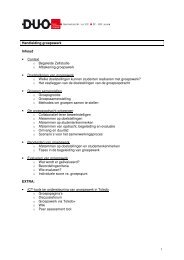EQUALITY GUIdE - KU Leuven
EQUALITY GUIdE - KU Leuven
EQUALITY GUIdE - KU Leuven
Create successful ePaper yourself
Turn your PDF publications into a flip-book with our unique Google optimized e-Paper software.
Chapter 5 ! Mentoring 267<br />
Mentors unanimously agreed upon the importance of an introductory meeting between<br />
mentor and mentee. They were satisfied or very satisfied with this. Two mentees mentioned<br />
it to be important as well and they were satisfied with their introductory talks.<br />
One mentee said this is unimportant, but she was satisfied with her talk. She did make<br />
an additional remark saying that it is “a bit a waste of time and it is better to get to the<br />
point immediately”.<br />
Two of the three mentors thought it was very important to have no hierarchical relation<br />
between mentor and mentee, one mentor took a neutral stance. All mentees said it to<br />
be important or very important not to have such a relationship with their mentor. With<br />
respect to a cross-departmental match, one mentee notified that it is sometimes difficult<br />
to give advice from a different field of expertise because the approach is “very different”.<br />
A mentor also mentioned this and suggested to form duos within the own faculty.<br />
It was very important for all mentees that the mentor knew the organization and acted<br />
as a role model. Both mentors and mentees thought that it was very important for the<br />
mentor and mentee to ‘click’ and that there should be an open communication.<br />
Training<br />
All mentors thought it was important to very important that the mentors attended a<br />
training course. Two of them attended the Jive training and were very happy they did.<br />
Mentees also agreed that training is important to very important. One of them was very<br />
satisfied; the two others took a neutral stance. Of the latter, one remarked that you do<br />
not only have to know ‘what’ you want to discuss with your mentor but also ‘how’ to<br />
do so. She asked for tips to get the mentor to help her to the maximum.<br />
The mentors thought it was important or very important that the mentee had clear<br />
goals about what she wanted to work on, that the mentee took the initiative in the<br />
relationship and prepared the meetings. The mentees also said that it is important that<br />
the relationship is guided by the aims of the mentee.<br />
4.2.2.3.4. Follow up, networking and closing<br />
One mentor said it is important that a process supervisor follows the project and was<br />
satisfied by the way this worked in the project. Two other mentors took a neutral stance<br />
both on the presence of such a supervisor and on the degree of satisfaction. Two mentees<br />
thought it was important to have such a process supervisor and were satisfied; one<br />
mentee took a neutral stance. The variety of the answers might be related to the fact<br />
that there was an internal and an external coordinator. It could be that there was insufficient<br />
clarity about the roles of both coordinators.<br />
All mentors thought it was important to have supporting forms and documents. Two of<br />
them were satisfied, one took a neutral stance. Two mentees argued that supporting<br />
forms are important and one of them was satisfied, the other took a neutral stance. The<br />
third mentee thought this was unimportant and took a neutral stance.<br />
Two mentors said it is important that the duration of the project is clear beforehand



